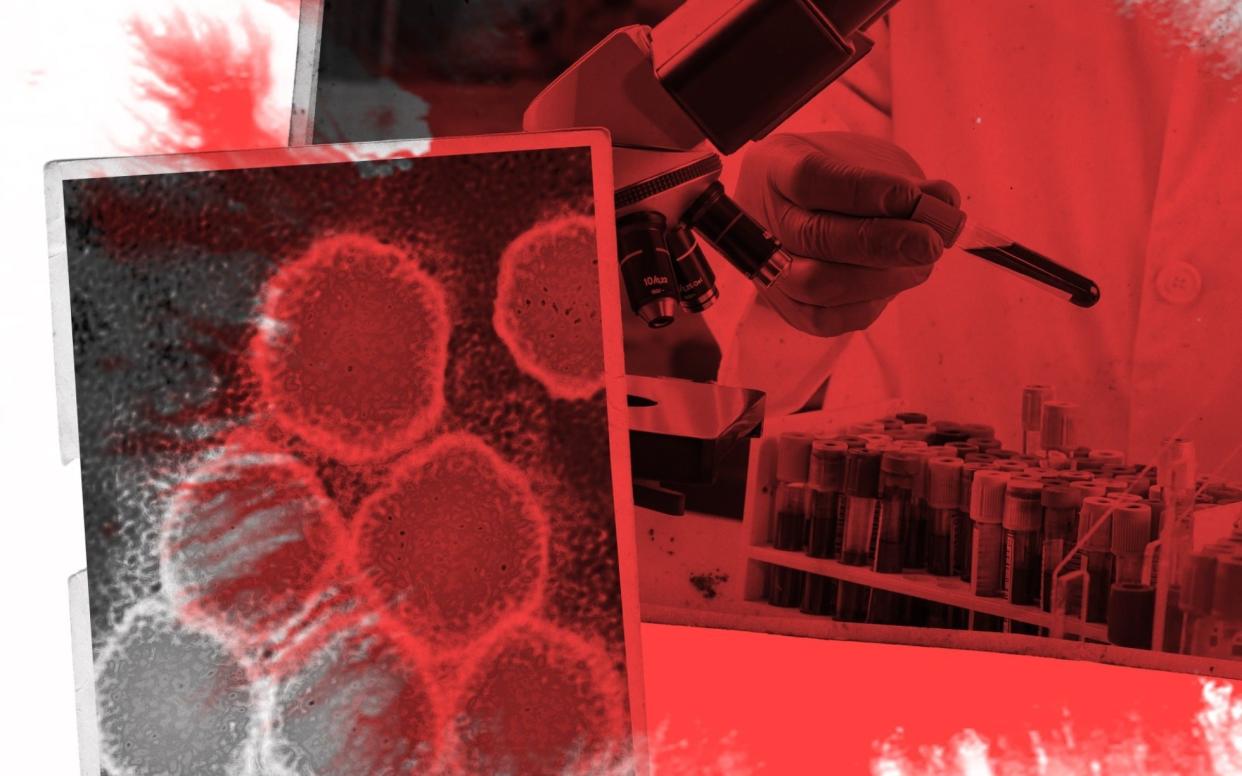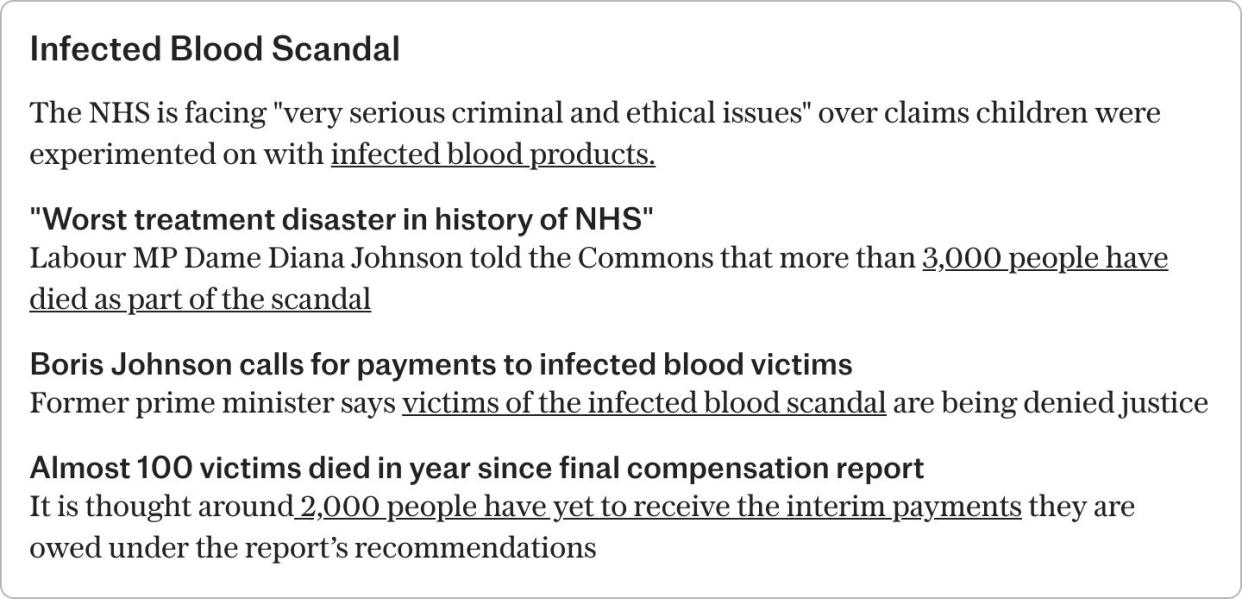Pharmaceutical giants knowingly sold HIV-infected treatment to NHS

Pharmaceutical companies knowingly sold a treatment infected with HIV to the NHS, The Telegraph can reveal.
Internal documents from American pharmaceutical companies show they knew a “wonder drug” made from human plasma could transmit HIV to patients, but they sold it regardless.
Some 1,250 people in the UK contracted HIV in the 70s and 80s from Factor VIII, a treatment for the bleeding disorder haemophilia. Up to 5,000 more also contracted hepatitis C.
The Infected Blood Inquiry will report later this month on mistakes that allowed Factor VIII contaminated with HIV and hepatitis C to be imported into the UK and prescribed to patients on the NHS.
Survivors who have been seeking justice for 40 years expect the final report on May 20 to be critical of Factor VIII manufacturers, successive governments, and doctors. The report will also explain how as many as 26,800 people contracted hepatitis C from blood transfusions.
When the first three people with haemophilia came down with AIDS in the US in July 1982, the Centers for Disease Control (CDC) warned the fatal illness could be caused by a blood-borne agent in Factor VIII.
In December 1982, Bayer’s Cutter Laboratories discovered chimpanzees had developed AIDS-like symptoms after also being treated with Factor VIII, according to an internal memo. However, the company didn’t warn patients about the potential risks.
As the dangers became clear, Bayer kept selling Factor VIII.
Having created a safer, heat-treated version without viruses in February 1984, Bayer continued to sell the HIV and hepatitis C-contaminated Factor VIII until August 1985.
The UK kept prescribing the dangerous version of Factor VIII until late 1985, and it never recalled it from hospitals.
Cutter rejected the idea of recalling its infected Factor VIII from Asian countries in 1984 because it could cost “up to $2 million worth of sales”, according to documents published in The Poison Line: Life and Death in the Infected Blood Scandal.
A year later, the company’s marketing plan said, “AIDS has not become a major issue in Asia.” The company outlined how it would dump the infected product in countries including Taiwan, Hong Kong, Malaysia, Singapore and Argentina. It added that “hysteria over AIDS could reduce our sales by as much as $400,000.”
In another case, Revlon Healthcare-owned Armour Pharmaceuticals suppressed evidence from 1985 to 1986 that HIV had been discovered in its “safe” version of Factor VIII, which had been heat-treated to kill viruses. Rather than withdrawing the faulty product from sale, the company deemed the problem a “marketing issue” and covered it up.
Six patients in the UK contracted HIV from that version of Factor VIII which had been licensed as safe from blood-borne viruses.
Dr Alfred Prince, a researcher at the New York Blood Center, found traces of HIV in Armour’s heat-treated Factor VIII in October 1985. But the company reacted to it as a financial threat, rather than a public health risk.
“The issue is not one of regulation, but rather of marketing,” said Dr Mike Rodell, vice president of regulatory and technical affairs at Revlon Healthcare. He said the company was at risk of losing $6 million in sales.
Armour and Dr Rodell, both of whom were acquitted by a Judge of criminal charges of negligence in Canada, chose to keep the information secret from the US Food and Drug Administration and keep selling the high-risk Factor VIII.
After Dr Peter Jones, head of the haemophilia centre in Newcastle, told Armour four patients had tested positive for HIV after using the treatment, the company denied HIV had ever been found in its product.
It took the company seven months to warn the Department of Health that traces of HIV had in fact been found. A further two children had been infected with the virus by October 1986 when it was withdrawn from the UK.
“We see precisely the same attitude from Armour here as we do throughout the whole period in which people are being infected,” said Jason Evans, director of Factor 8. “It’s clear that Armour’s overriding concern is market share and profits, not patient safety.”
He added, “People were infected through the deliberate sale of a product that was known to be infected. If that’s not criminal, I really don’t know what is.”
No charges have ever been brought in the UK for anyone involved in the infected blood scandal.
Christopher Bishop, former marketing manager, managing director of Armour in the UK and one of the only pharma representatives to give evidence at the Infected Blood Inquiry, said the delay in reacting to news that patients in the UK and Holland had contracted HIV was to prevent patients from panicking.
“I was aware of the Prince study,” he said. “The concern was that this was putting the frighteners into patients without the full facts being available.”
Quizzed by the Inquiry over why the company insisted the product was safe while still conducting tests, Mr Bishop said, “Until further information was available and proven ... we were still confident that our product was safe.”
Sir Biran Langstaff, chair of the Infected Blood Inquiry, pushed back: “But if you’re investigating whether it is safe, how can you be confident that it is, without waiting?
“In other words, have you not got it perhaps the wrong way around, that you can’t be confident until you’ve done the investigations and they show there is no reason to worry?”
Mr Bishop replied: “Well, one way is a negative way of putting it, the other way is a positive way.”
Before antiretroviral treatments for HIV became available in the mid-1990s a diagnosis was viewed as a death sentence. The associated stigma led to people losing their jobs, struggling to get mortgages and being publicly attacked.
It was clear from the 1970s that Factor VIII transmitted hepatitis C but US companies continued to pay high-risk donors for their plasma at centres in prisons, impoverished city centres, nightclub districts and STI clinics.
A spokesman for Bayer said it is cooperating with the Infected Blood Inquiry and it would be inappropriate to comment in detail before the report.
“Bayer is truly sorry that this tragic situation occurred and that therapies that were developed by Bayer Group companies, and were prescribed by doctors to save and improve lives, in fact, ended up causing so much suffering to so many.”
CSL Behring, which acquired Armour’s manufacturing facilities in 2004 said: “We cannot comment on the historical activities of Armour Pharmaceuticals.”
The Poison Line: Life and Death in the Infected Blood Scandal by Cara McGoogan is out now.
Listen to Bed of Lies, a six-part Telegraph podcast laying bare one of the biggest medical disasters in history, on Apple Podcasts, Spotify or your preferred podcast app.



